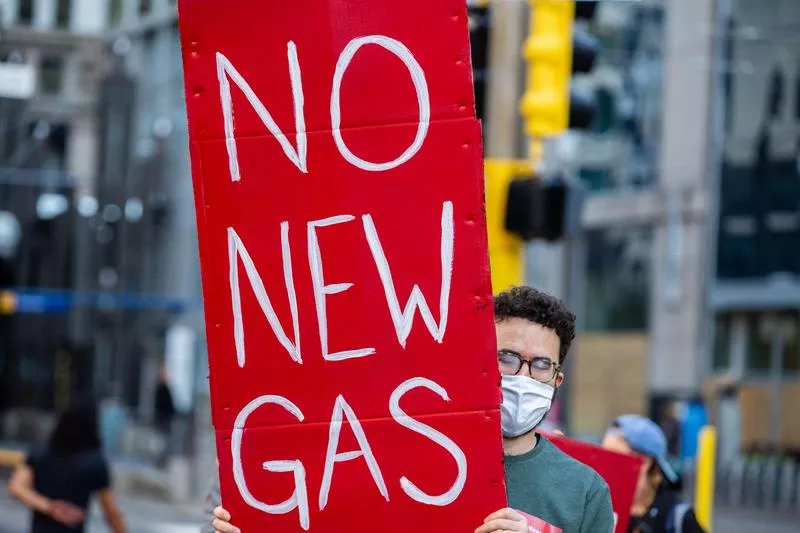
The fossil fuel industry wants us to believe that "natural gas" is clean. The truth is "natural gas" is primarily methane—a dangerous greenhouse gas and indoor air pollutant.
Hydraulic fracturing, or “fracking” for short, extracts “natural” gas from tight rock formations below the surface using fluids, gasses, and chemicals that contaminate groundwater and pollute surrounding communities. Minnesota does not have any fracking in-state, so we spend billions each year piping in gas from other states, which then gets refined at Minnesota gas plants and distributed to our homes and buildings for heating, cooling, and cooking. This accounts for 26% of total fossil fuel emissions in the state.
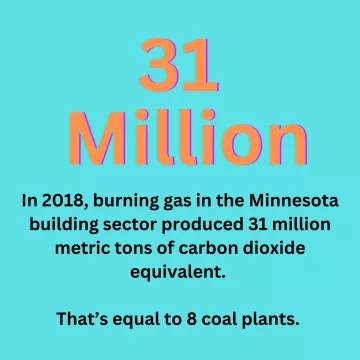
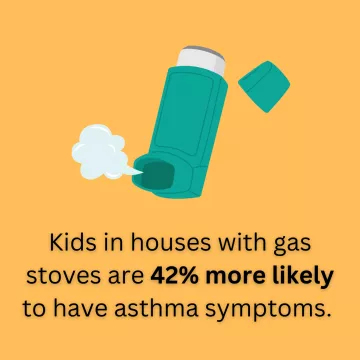
In addition to exacerbating climate change, burning gas appliances in our homes—such as gas furnaces, water heaters, stoves, and more—emit toxic chemicals like nitrogen oxides (NOx) into the air we breathe. NOx exposure causes coughing, wheezing, asthma attacks, reduced lung function, cancer, and respiratory inflammation.
Cost
Natural gas is already a volatile fuel, cost-wise. And as more people switch from gas to electric appliances, fewer people will be on the gas system, resulting in excessive bill increases.
Low-income people and communities of color are most vulnerable to climate impacts, indoor air pollution, and increasing energy bills. It is of the highest importance that the transition from gas to electrification is prioritized in these communities.
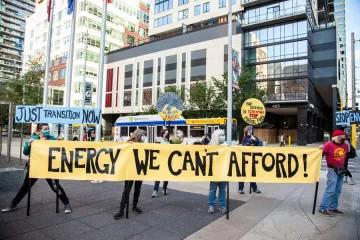
Proposed New Gas Plants
Xcel Peakers: Xcel Energy has proposed two 400-megawatt gas peaker plants—one in Lyon County, Minnesota, and one in Fargo, North Dakota that would serve Minnesota customers.
NTEC: Minnesota Power, in partnership with Dairyland Power Cooperative, has proposed the Nemadji Trail Energy Center (NTEC), a new $1 billion, 625-megawatt gas plant to be built in Superior, WI. The Superior Plan Commission and city council have voted no on the utility’s local permit requests necessary for construction. We’re winning, but the fight isn’t over yet.
RPU: Rochester Public Utilities is considering including a 50-megawatt gas peaker plant as they plan for their net 100% renewable energy goal by 2030. Our volunteer leaders and partners fought hard to win the 100% renewable commitment in 2019, and we continue to advocate for the cleanest 2030 power plan possible.
Our Demands
- No New Gas Plants!
We should not and cannot be building more fossil fuel plants in a climate crisis. Full stop. We will oppose the new gas plants proposed for Minnesota and instead push for our energy needs to be met with energy efficiency, electricity, and geothermal.
- Gas Free Homes!
We will support policies that replace our gas-powered appliances with electric alternatives, and weatherize our homes so we’re using less energy in the first place.
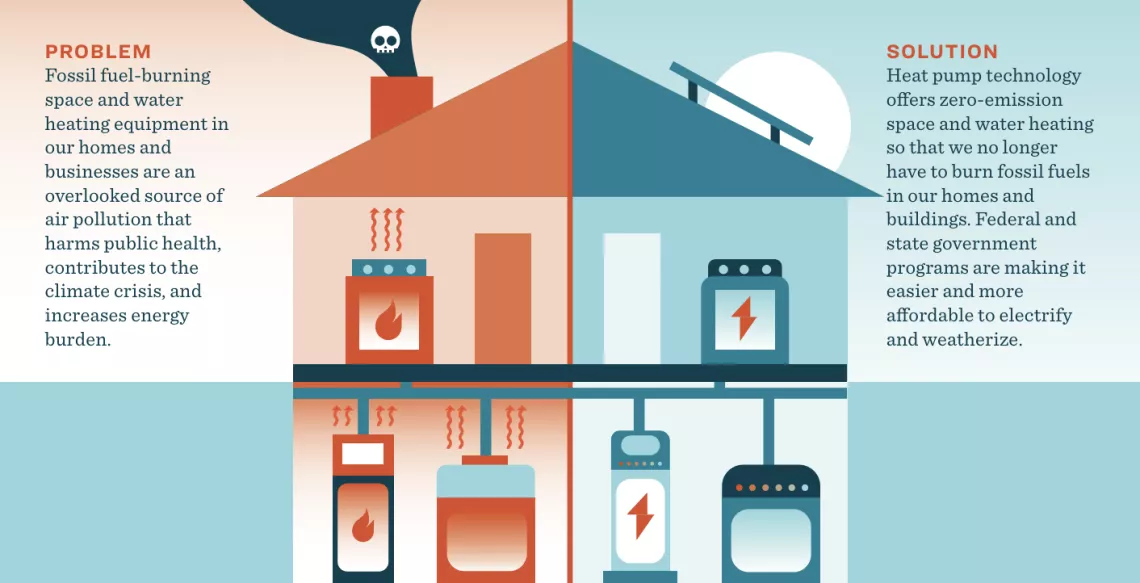
How to get involved
The fight to stop gas lives at state legislatures, city councils, and the Public Utilities Commission (PUC).
The PUC
The Public Utilities Commission is a 5-member board appointed by the Governor, who regulates our investor-owned monopoly utilities (like Xcel, CenterPoint, and Minnesota Power) and makes decisions on energy infrastructure in the state.
Stopping gas plants
- Minnesota Power and Xcel Energy both will need to bring their 15-year energy plans to the PUC—and both their plans include new gas plants. There will be opportunities to comment on their plans to show the state their customers oppose the gas plants.
Gas free homes
- Sierra Club is part of the Clean Heat Coalition, which includes many organizations working on gas-free homes. The Coalition is focusing on 3 major dockets at the PUC:
- Xcel and CenterPoint Innovation Plans: these are essentially decarbonization plans, but unfortunately they include many false solutions that won’t result in the emissions reductions we need. We must call for the utilities to invest in real climate solutions, like efficiency, electrification, and geothermal. Not greenwashing.
- Gas Utility Long-Term Plans (AKA Gas Integrated Resource Plans): Investor-owned gas utilities now have to build 15-year plans, like electric utilities have been doing for a long time. This will allow us to ensure their long-term plans align with the state’s climate goals.
- The Future of Gas Docket: This docket will explore how the gas system needs to change to align with climate goals. In short, the system needs to be decommissioned and replaced with efficiency, electrification, and geothermal.
The State Legislature
State policy will be another important tool in the transition away from gas. In 2023 we passed the 100% clean electricity bill. While this bill was a huge step forward, it only applies to electric utilities, not gas utilities. Whether it’s setting a similar goal for gas utilities, creating appliance standards, or new rules for gas hookups in new construction, stay tuned for state-level policy pushes here in Minnesota.
City Level Actions
Cities don’t need to wait for the state to take action on gas decarbonization. They can improve building performance standards to cap energy use, set emissions standards to improve indoor air quality, and create programs that incentivize residents and building owners to go electric.
We also need to hold cities accountable to ensure they don’t build new gas plants either. For example, in Rochester.
The urgency to Pass on Gas by phasing out gas plants and eliminating gas from our homes and buildings is necessary for our climate, our health, and our pocketbooks. However, achieving this transition requires collective action. By building public demand and raising awareness of the benefits, we can drive policy changes and technological innovations that support a cleaner, healthier, and more affordable energy future. Together, we can create a groundswell of support that creates a just transition to a gas-free world.
